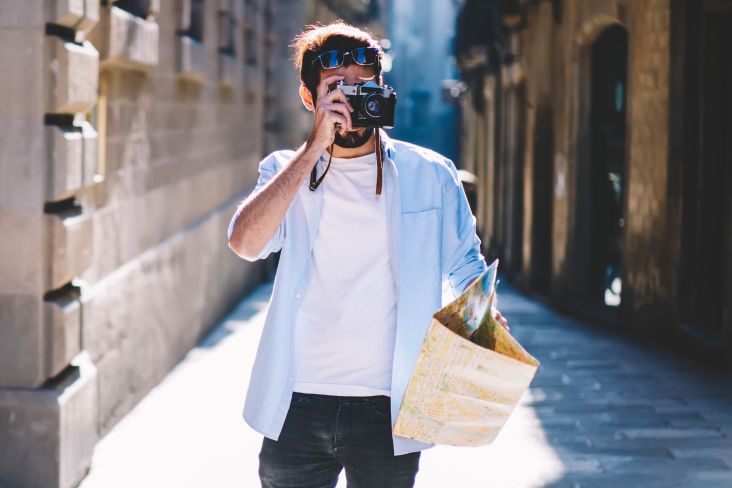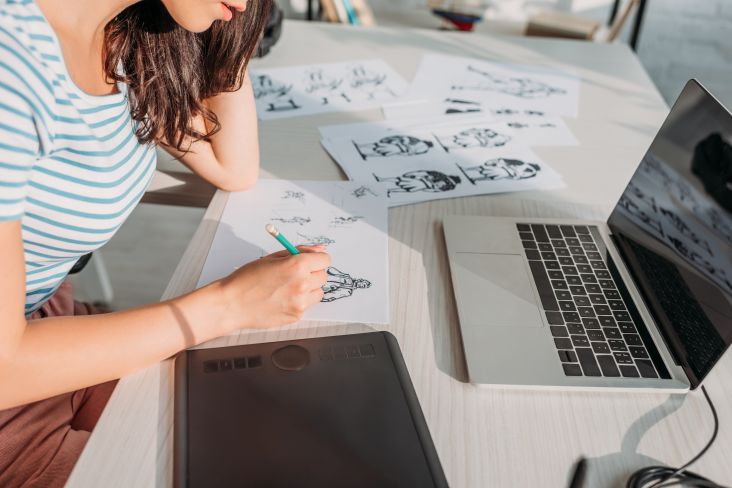Algorithms, AI and Income: How creative freelancers are finding 2024 so far
As we approach the middle of 2024, the economy is growing again. But is this feeding through into freelancers' pockets? We take stock of how the year is shaping up.

Image courtesy of Adobe Stock
After narrowly avoiding a recession in 2023, the UK economy grew by a better-than-expected 0.6% in the first quarter of 2024, according to official figures. This marked an end to a mild technical recession in the second half of last year, as consumer spending and business investment recovered.
Most importantly, prices now seem to be under control. At time of writing, inflation was down to just 3.2%, compared with 10.1% this time last year. That's broadly in line with most Western countries – although do spare a thought for the citizens of Turkey, where it's currently 69.8%, and Argentina, where it's 289%.
In the UK, real wage growth has started to outpace inflation, which is providing some relief after a painful cost-of-living crisis. Yet raw data is one thing. What we want to know is whether this is feeding through to freelancers' pockets.
To find out, we canvassed the Creative Boom community on Twitter and Threads, and this is what they had to say.
Finding it a struggle
Broadly speaking, the response from freelance creatives paints a mixed picture. Some are seriously struggling with a lack of work, while others have remained busy by adapting their services and income streams.
Most strikingly, illustrators seem to be facing a particularly tough climate right now. A shocking number of you are reporting a lack of new commissions and projects.
"This year I had the worst start to a year in almost nine years of being self-employed," adds artist and designer Alex Szabo-Haslam, who decided in March to go back to full-time employment. "Almost every freelancer I know tells me they're struggling."
Importantly, this is not just a UK phenomenon. "On the illustration side of things, I haven't had that much work come in," says Barcelona-based illustrator Alex Foxley. "It seems to be the case for most people in the industry, which is pretty worrying." Art director and illustrator Shanée Benjamin, who lives and works in Brooklyn, echoes this sentiment, saying: "This has been the hardest year so far. Jobs are scarce, and I'm contemplating on going in-house again, which is killing my mental health." And Stockholm-based illustrator Danilo Agutoli puts it most succinctly of all, saying of 2024: "It's shit, real shit."
Even when work is commissioned, obstacles often appear, leaving freelancers in dire financial insecurity. "The year started really great for me, with lots of work from new clients," says illustrator Lara Paulussen. "But for the last two months, it's been really slow again. I've had some commission requests, but they keep getting delayed or cancelled, which is really frustrating. Also, my social media reach is decreasing a lot. This makes me somewhat insecure, and I fear that my illustration style may not be in demand anymore."
Algorithms and AI
On that last point, we question whether that's down to the style of Laura's work or more to do with recent algorithm changes, a topic we address in our article Instagram is dead to us... so what's next for creatives?. Some are also wondering whether this disruption is purely about the economy or partly due to the rise of AI-generated imagery. As illustrator and printmaker Brendan Totten notes: "I recently found out one of my previous clients has started consistently using AI images on their social media, which is disappointing to see."
Anyone who's scrolled through Facebook will have noticed this recently. You can tell just by looking at many images that they've been created by generative AI tools such as Midjourney and DALL-E 2. And AI isn't just a threat to illustrators.
"Many, many people think they now know how to write and understand marketing due to AI," complains CMO Nina Cleere. "Without editing. Which is awful! Not elevating, empowering, or whatever other word AI uses every time! Ad spending is down; cost is up. I feel like it's all shifting and not final."
Cautiously optimistic
That said, some are having a less crappy 2024 than others. "It's not great, but not as bad as some periods over the last few years," says illustrator and artist Abi Daker. "I'm looking at the fact I'm still going and don't owe any major bills from my business; if I can stay working, I'll be happy."
Interior and architecture photographer Jak Spedding also feels that things are on the up. "The first three months were pretty static, which was a worry as there's usually a bit of a rush after Christmas," he says. "But last month, it randomly picked up. And now I'm working five, six days a week for the foreseeable future."
Illustrator and artist Alyah Holmes is also feeling optimistic. "After about three years of freelance illustration, I finally feel less imposter syndrome and more fun and excitement while working," she enthuses. "I used to be so scared to fail with every new project; now I've built up confidence and a process that I feel happy and comfortable with. I still get nervous, but it's balanced with excitement!"
The need to adapt
More generally, those who straddle several disciplines seem to have been more resilient in these difficult times. As noted earlier, Alex Foley has struggled to get illustration work. "But I've had a surprising amount of design and branding projects come my way, which has kept me nice and busy," he says. "Being able to adapt and provide alternative services can really help when things get tough."
Designer and developer Derek Mohr tells a similar story. "I'm finding web design and development being requested much more than branding," he says. "Which is fine, just not quite as flashy for the portfolio."
Even if you are multidisciplinary, that doesn't mean everything is peachy right now. Illustrator and designer Alice Roseberry-Haynes speaks for many when she says: "It's been mixed. I've worked on a dream project that's coming out next week, which ticks many, many goals of mine. On the other hand, I've also had huge gaps. We shall see what the next six months are like!"
Time to upskill?
Overall, though, it seems that in tough times, the more strings you have to your bow, the better. Take creative director Asa Roger. "It's been a busy 2024 since the new tax year," he says. "Projects are coming in across a real variety of work: photography, brand, packaging, website design and creative direction. Even a little consultancy day-rate work, which was welcome. Without that range, though, it'd be pretty quiet in any of those fields. So offering all these services has really helped."
With this in mind, it seems like a good time to upskill. "I've started the new year badly," says graphic designer Lisa Fernández Karlsson. "The family company that I worked for on a regular basis was taken over by the bank. So I used this break from my day job to take some courses and discovered my passion for editorial illustration. Now, as a freelancer, I'm working for the same family company, establishing their new brand. And, at the same time, try to get into the editorial world by contacting art directors for various magazines."
At the same time, we're hearing that many of you are seeking different income streams to balance out the risk of freelancing in future. Illustrator and artist Rachael Presky offers a prime example.
"I've had a very random four months, really," she reports. "I had a big job which has kept us afloat, but then also not a lot else. After niche-ing, I've tried to start doing some different projects again and sharing them, too, reopening a print shop, etc., to have a few income streams. My husband is also feeling it as a freelance DOP. Hoping it all picks up again soon, or I'll be back in an office."
Conclusion
While the economic recovery in 2024 has brought some relief after a difficult 2023, it's clear that, at best, many freelance creatives are experiencing a mixed bag so far this year.
Some are struggling mightily with a lack of new projects and financial insecurity, particularly illustrators impacted by algorithm changes and the rise of AI-generated imagery. Others have been able to adapt and diversify their services to stay afloat.
As a result, one overarching theme is emerging. Freelancers who are willing to expand their skills, become multidisciplinary, and seek out additional income streams will probably fare the best in the increasingly challenging and unpredictable economic landscape of the mid-to-late 2020s.




 by Tüpokompanii](https://www.creativeboom.com/upload/articles/58/58684538770fb5b428dc1882f7a732f153500153_732.jpg)


 using <a href="https://www.ohnotype.co/fonts/obviously" target="_blank">Obviously</a> by Oh No Type Co., Art Director, Brand & Creative—Spotify](https://www.creativeboom.com/upload/articles/6e/6ed31eddc26fa563f213fc76d6993dab9231ffe4_732.jpg)
















